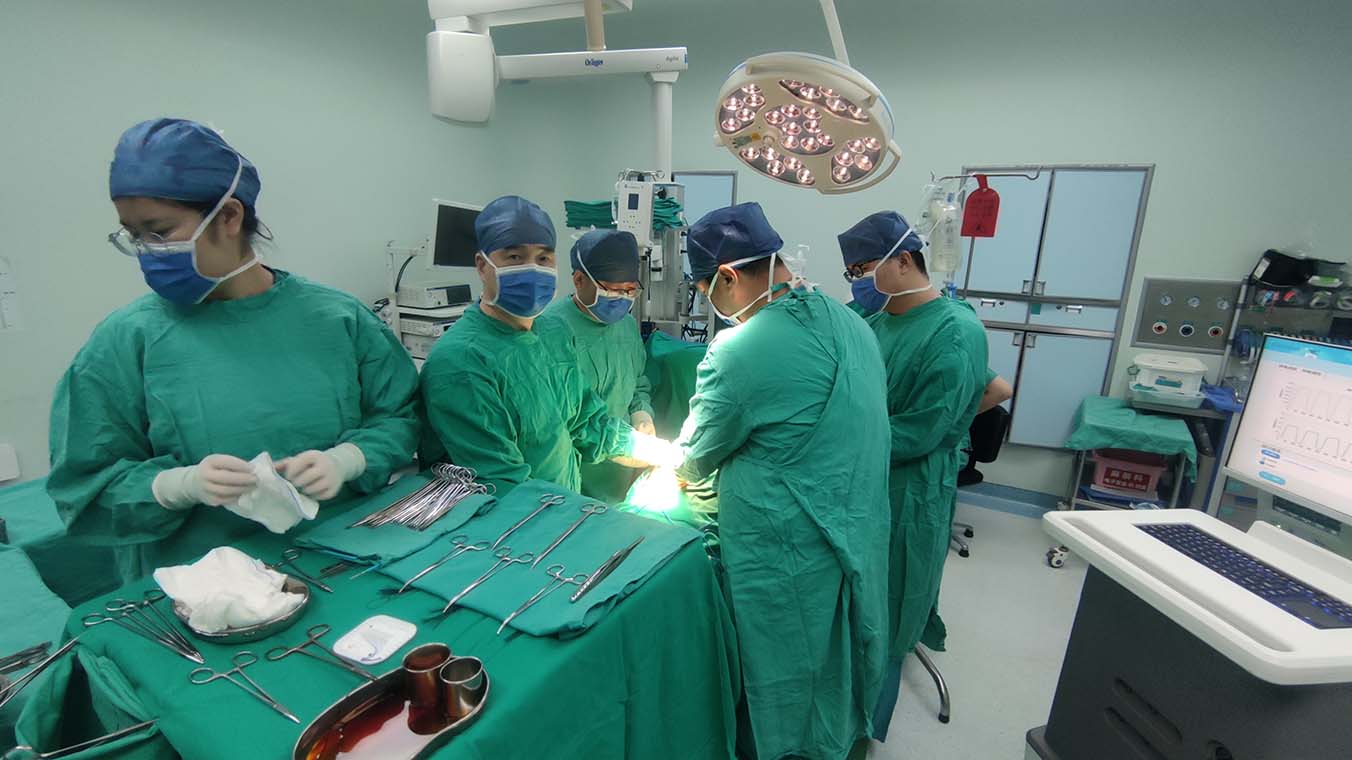

The patient is a 57-year-old male who complained of intermittent upper abdominal pain and poor appetite for more than 2 months, which worsened in the past day. He was admitted to the hospital. Ultrasound and gastroscopy examination showed thickening of the distal end of the common bile duct, with a thickness of about 6mm, and an enlarged gallbladder. Enhanced CT scan showed significant thickening and enhancement of the wall of the hepatic duct-common bile duct junction, with slight dilation of the intrahepatic bile ducts, suggesting a bile duct occupying lesion. An irregular mass with a central low-density necrotic area and uneven enhancement was seen in the porta hepatis-pancreatic head space, suggesting metastasis.
After consultation, Dr. Deyu Li and his team from the Hepatobiliary and Pancreatic Surgery Department of Henan Provincial People's Hospital stated that the tumor was located in a special position, at the porta hepatis-pancreatic head space, adjacent to the celiac trunk and superior mesenteric artery, which posed a great challenge for surgery and conventional thermal ablation therapy. However, the Nanoknife ablation technology can be attempted as it can kill tumor cells, activate the body's immune system to engulf the remaining tumor cell fragments without damaging the pancreatic duct and surrounding large blood vessels. On March 15th, Dr. Li and his team successfully performed intraoperative Nanoknife ablation for the patient using the domestically produced Nanoknife system, the Steep Pulse Minimally Invasive Therapeutic System developed and produced by Shanghai Yuanshan Medical Technology Co., Ltd.

The patient underwent Nanoknife treatment in the form of intraoperative needle placement, with double needles wrapped around the lesion for ablation. The ablation process was monitored in real time to observe the patient's condition. After the first pulse was released, the instrument displayed no clear current increase and there was no obvious change in the tumor under the naked eye. After communicating with the engineer, Dr. Li Deyu immediately readjusted the needle placement. After the second pulse was released, the instrument showed a significant increase in current and the tumor changed significantly under the naked eye. The tumor was ablated in just 5 minutes.
One month after the operation, the patient Mr. Tian came to the hospital for review, and the CT image showed that the tumor volume was significantly reduced and the treatment effect was remarkable.

In recent years, Professor Li Deyu of Henan Provincial People's Hospital has led the hepatobiliary surgery team to carry out laparoscopic hepatectomy, laparoscopic pancreatic surgery, laparoscopic radical surgery for gallbladder cancer, and proposed precise pancreaticoduodenectomy and precise radical surgery for hilar bile duct cancer. It is not only in the leading position in Henan Province, but also brings advanced experience to national and even international conferences for sharing, and has a deep and long-term influence in the industry. This time, he was the first in the province to successfully carry out the latest intraoperative tumor nano-knife ablation, continuing to interpret the concept of "minimally invasive surgery with precision and rapid recovery".
Director Li Deyu gave certain recognition to the domestic nanocutter technology used in the treatment, especially the function of real-time display of current during the treatment, which allows the operator to adjust the position of the needle at any time, making the treatment more efficient and fast. At the same time, the localized nano-knife technology also makes it more possible for the technology that was originally monopolized by Europe and America to reach the public. Nano knife ablation surgery can selectively ablate without damaging the gallbladder, bile ducts, blood vessels and other important structures, with short time and small incision, and can also be used in combination with other multidisciplinary disciplines. The success of this operation will be a good start, and we hope that the nanosaber ablation technology can be gradually promoted in clinical practice to benefit more patients.

|
Li Deyu Associate Professor/Chief Physician/Doctor of Medicine - Special allowance expert of the State Council - Renowned physician of the nation, outstanding achievements. - Executive Director of the College of Surgery, Henan Provincial People's Hospital, Director of the Department of Major Surgery, Director of the Specialized Surgery and Residency Training Base, Director of General Surgery, Director of Hepatobiliary and Pancreatic Surgery - National Standing Committee of the Chinese Physicians Association of Surgeons Branch - National member of the Hepatology Group of the Chinese Medical Association Surgery Branch - National Standing Committee of Liver Surgery Committee of Chinese Physicians Association - National Standing Committee of China Laparoscopic Liver Resection Development and Promotion Expert Committee of Chinese Physicians Association - Vice Chairman of ERAS Committee of Hepatobiliary and Pancreatic Surgery, International Hepatobiliary and Pancreatic Association, China Branch - Director of Hepatocellular Carcinoma Committee, Chinese Society for Geriatric Medicine Research - National Member of the National Cancer Quality Control Center Hepatocellular Carcinoma Quality Control Expert Committee - Standing Committee Member of Pancreatic Specialty Committee of China Research Hospital Association - Director of Hepatobiliary Surgery Branch of Henan Provincial Physicians Association - Deputy Director of the Society of Surgery of the Chinese Medical Association of Henan Province - Deputy Director of Rapid Rehabilitation Society of Henan Provincial Physicians Association - Director of General Surgery Committee of Henan Provincial Graphic Image Society The editorial board or review experts of many journals, such as "Chinese Journal of Hepatobiliary Surgery", "Chinese Journal of Digestive Surgery", "Chinese Journal of General Surgery", "Chinese Journal of Minimally Invasive Surgery", "Chinese Journal of Practical Diagnosis and Treatment", "Chinese Journal of Practical Surgery", "Chinese Journal of Metastasis and Tumor", "Hepatocellular Carcinoma Electronic Journal", "World Chinese Journal of Digestion", "Journal of Abdominal Surgery", etc. |